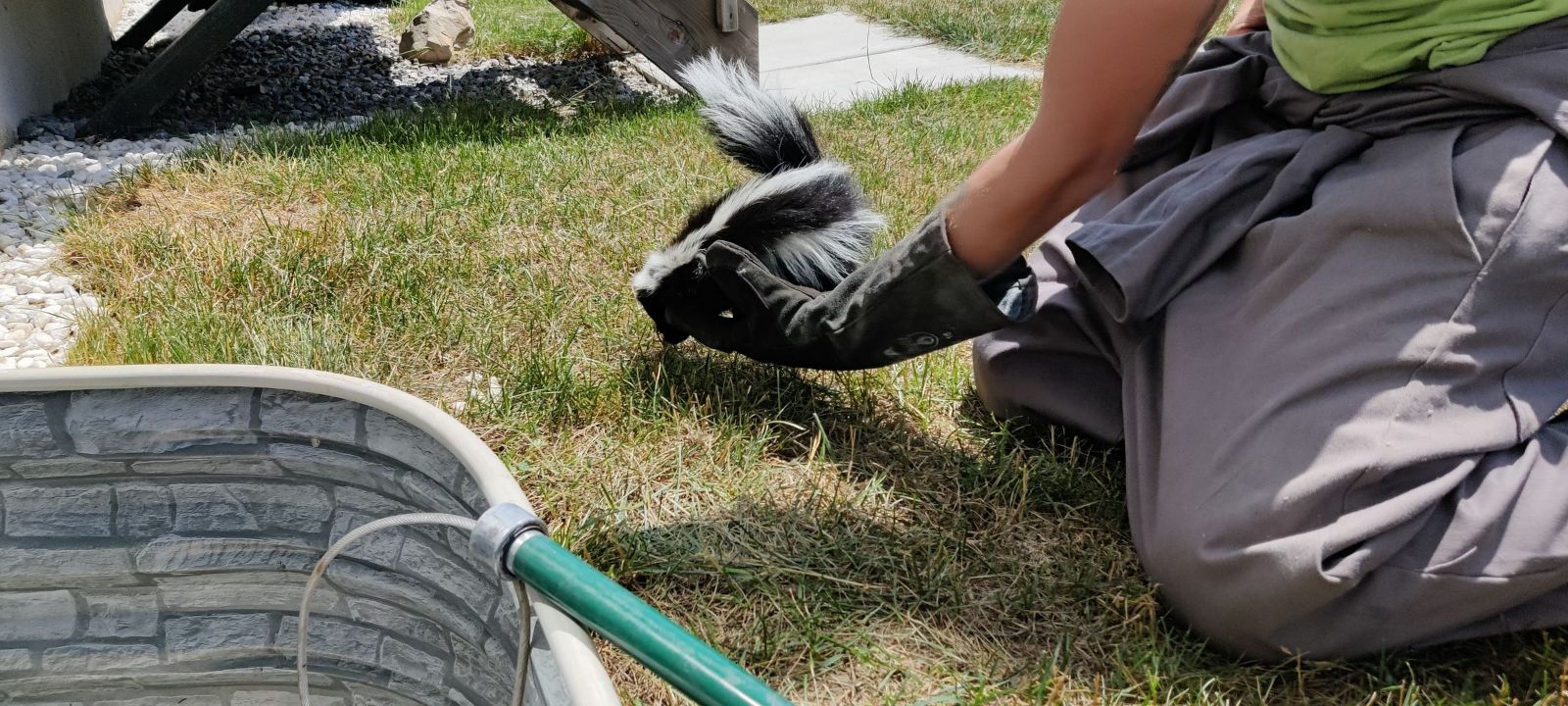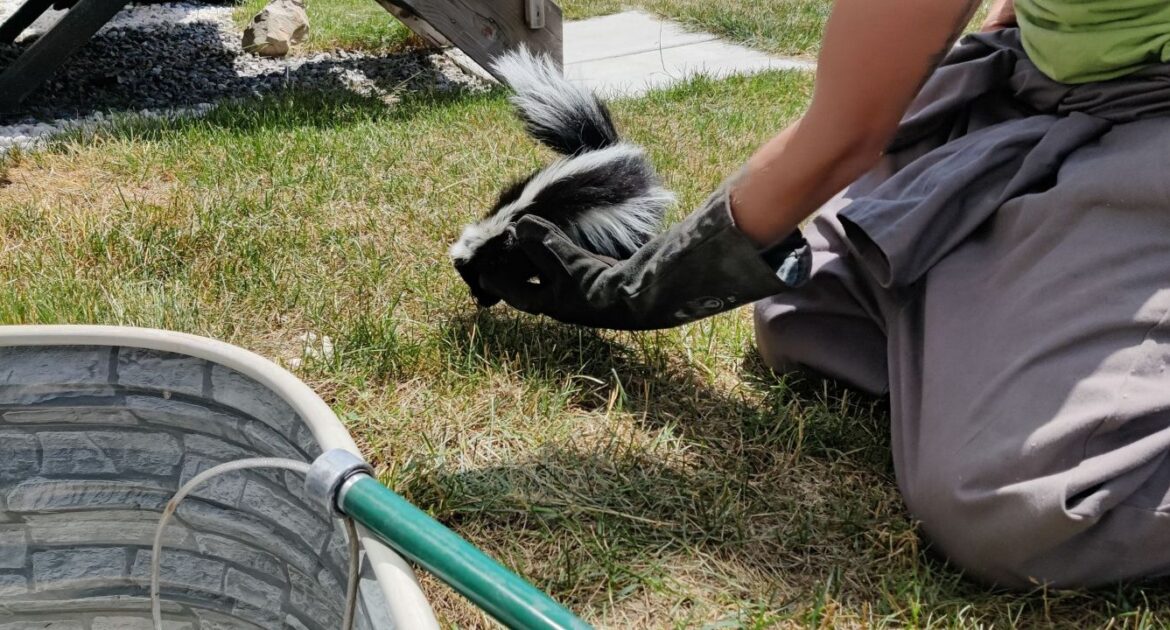Have you noticed skunks wandering through your yard or hiding in your neighborhood? It’s more common than you might think. Skunks are adaptable animals that do really well in places where they can easily find food, water, and shelter. Urban wildlife habitats and suburban neighborhoods are full of these opportunities, which is why skunks are drawn to these areas.
Skunks are often attracted by things like uncovered trash, pet food left outside, or spilled birdseed. They also look for places to build their dens, like under decks or sheds. Add in easy access to water from puddles or leaky faucets, and you’ve got everything a skunk needs to settle in. Understanding these attractants can help you figure out the best ways to keep them out of your yard.
At Skedaddle Humane Wildlife Control in Saint Paul, we focus on skunk deterrents and suburban wildlife management. With a few simple preventative steps, you can make your property less appealing to skunks while keeping your home safe. Below, we’ll explain the most common things that attract skunks and share effective yet humane solutions to keep them away.
Easy Access to Food Sources
Skunks aren’t picky eaters. If it’s easy to find food on your property, they’ll stick around. Common attractants include unsecured garbage cans, leftover pet food, and birdseed that’s spilled beneath feeders. These are quick and simple meals for a hungry skunk.
Even compost piles or fruit that falls from trees can be an inviting treat. Something as ordinary as a fallen apple can encourage skunks to visit. This is especially a concern in suburban neighborhoods, where homeowners might overlook cleaning up these food sources.
To fix this, take small but effective steps. Bring pet food and water dishes inside at night and invest in bird feeders that don’t spill too much seed. Garbage cans should have secure lids that can’t be knocked off. These simple actions can make your yard less attractive to skunks looking for a snack.
Sheltered Spots for Skunks to Nest
Skunks love dark, quiet places where they can nest and hide during the day. Common nesting spots include spaces under decks, porches, sheds, and piles of wood. They’ll also use any small openings in basements or garages if they find them.
Homes that aren’t well-maintained or have loose boards around the deck or shed are more likely to attract skunks. If they find a good shelter, they often stay nearby for a long time, especially if they’re raising young.
To avoid this, inspect your property for possible nesting areas. Seal gaps or spaces under structures with sturdy materials like hardware cloth. Regularly check around sheds, porches, and decks for loose boards or holes. Blocking off these spots before skunks find them can save you a lot of trouble later.
Water Sources in Your Yard
Animals need water to survive, and skunks are always on the lookout for reliable sources. Birdbaths, garden ponds, and puddles from leaky outdoor hoses or faucets are all appealing to them. After heavy rains, poorly drained areas in your yard might become another water source for skunks.
To reduce the chances of skunks visiting, look for and eliminate standing water around your home. Fix leaking hoses or faucets, and make sure your yard drains properly. This small step can go a long way in making your property less inviting to these animals.
Lawns Full of Grubs and Bugs
If you’ve found small, cone-shaped holes in your lawn, skunks might be digging for insects and grubs. They rely on these critters as a food source and will tear up your yard at night looking for them.
Lawns with poor drainage or too much moisture tend to attract more grubs, which in turn attracts skunks. Left untouched, this can lead to frequent digging and damaged grass.
To prevent this, take care of your lawn. Aerate the soil, improve drainage, and use treatments that naturally reduce grub populations. A healthy lawn won’t just look better; it will also discourage skunks from visiting in search of food.
Why Skunks Feel Safe in Neighborhoods
One reason skunks thrive in urban and suburban settings is the lack of natural predators. Larger animals like coyotes or foxes are less common in these areas, making skunks feel safer. Even human-created features like streetlights or backyard floodlights can help deter predators without bothering skunks.
While you can’t completely control predator activity or turn off all lighting, you can focus on other steps to make your property less appealing. Address food, shelter, and water attractants to create an environment that encourages skunks to move along to another spot.
How to Safely Prevent Skunks
If you want to avoid skunks on your property, there are several easy, humane fixes you can try. These methods are effective without risking harm to the animals or your family.
- Secure Your Trash Bins: Use garbage cans with tight-fitting lids to keep skunks from rummaging for food. If possible, keep bins stored in the garage or a shed at night to reduce access.
- Remove Pet Food and Birdseed: Don’t leave pet food or water dishes outside overnight. For bird feeders, look for designs that spill less seed and only fill them during the day. Skunks are very active at night, so reducing food options then can make a big difference.
- Close Off Den Sites: Check for gaps or holes under decks, porches, and sheds. Block these areas with durable materials like lattice or hardware cloth, making them inaccessible to skunks. Regular inspections are especially helpful during spring when animals look for places to nest.
- Use Motion-Sensing Lights: Skunks feel safest in the dark. Motion-activated lights can startle them and discourage further exploration. Set them up near trash bins, porches, or other problem areas for the best results.
- Maintain Your Lawn: Keep your yard healthy to reduce insects and grubs which skunks dig up to eat. Address drainage issues, aerate the soil, and consider using treatments that won’t harm the environment. A tidy yard doesn’t just look good; it’s also less inviting to pests like skunks.
These strategies work together to make your yard less attractive to skunks. They’re simple to implement and help maintain a clean, safe environment for your family.
Keep Skunks Out with Humane Solutions
Skunks are drawn to urban wildlife habitats and suburban neighborhoods because of the easy access to food, water, and shelter. By understanding what attracts them and making smart changes, you can keep these animals away from your property. Securing your garbage, closing off potential nesting areas, and maintaining your yard are a few great ways to reduce skunk activity.
If skunks are still a problem, we’re here to help. At Skedaddle Humane Wildlife Control in Saint Paul, we focus on suburban wildlife management using effective and humane skunk deterrents. We’re committed to solving problems without harming animals, so everyone benefits.
Contact us today to request a quote and learn more about our services. With the right steps and professional help, you can keep your property skunk-free and enjoy a safer, cleaner home for you and your family.




